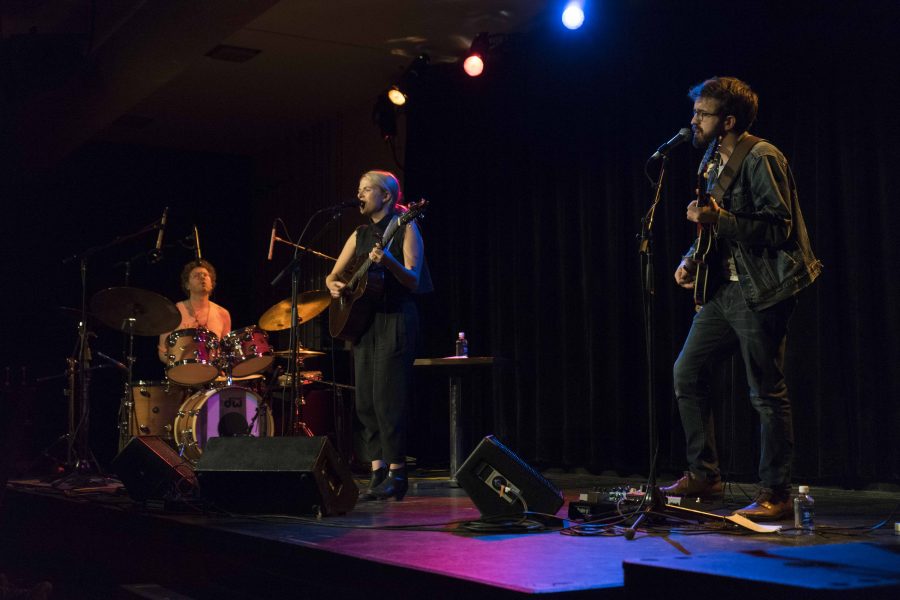Residency Program Adds New Focus on Songwriting
Aoife O’Donovan’s trio performs at the Cat in the Cream Tuesday night as part of the American Roots residency program. Ed Helms established the program in 2013.
November 4, 2016
Aoife O’Donovan arrived in Oberlin this week to lead a Conservatory songwriting masterclass Monday as part of the American Roots residency program, wrapping up her stay with a show at the Cat in the Cream Tuesday. Songwriting is a relatively recent addition to the masterclass program. However, as Dean of the Conservatory of Music Andrea Kalyn was eager to point out, the program represents a rich integration of media integral to the field of music.
“Songwriting has a long and vibrant tradition at Oberlin and — as Bob Dylan’s recent [Nobel Prize] in Literature underscores — is a natural area of focus as we explore new modes for connecting [and] learning across disciplines,” Kalyn said.
Educated at New England Conservatory, Irish-American folk singer O’Donovan has been performing for nearly her whole life, first making waves with her progressive bluegrass band Crooked Still. She has performed with artists such as Yo-Yo Ma, Chris Thile and Sara Watkins, as well as with Garrison Keillor on A Prairie Home Companion, and has released two full-length solo albums and a live album with her current trio. She has also appeared on numerous other albums from across the folk spectrum.
In 2013, actor-comedian Ed Helms, OC ’96, established the Oberlin American Roots residency program that sponsored O’Donovan’s visit. Since its creation, the fund has brought in artists working with a range of genres, most notably sponsoring several extended residencies with the acclaimed folk band the Punch Brothers. O’Donovan traveled to Oberlin last year as a supporting member of the Punch Brothers but returned this year with members of Crooked Still.
“We’re delighted to welcome Aoife back to Oberlin as part of the American Roots residency program,” Kalyn said, “both to work with student songwriters across campus and to share her own artistic voice and perspective.”
For O’Donovan, assuming authority on something as subjective as the quality of a work of art — particularly a song — is a nebulous prospect.
“There’s really no way to tell a room full of students what the perfect song is,” she said during her Tuesday night performance, “but [ Joni Mitchell’s] You Turn Me On, I’m a Radio is, for me, in the top five of perfect songs.”
Six students performed original work in the master class, which O’Donovan quickly turned into more of a workshop than a formal class setting. She told all the performers to sing twice, once without giving their peers any context and again after workshopping the piece and showing the audience the lyrics.
“[It’s important] to have an environment with people that we trust [to] give their opinions and take them or leave them,” O’Donovan said.
She also highlighted the importance of constructive criticism and the ability to both give and receive it.
“I’m really glad you guys are willing to say things [that you don’t like] about each others’ work. … It’s really important, especially in anything creative, to have a space to be able to say, ‘I actually didn’t like that.’”
Considering the discomfort most people feel at the prospect of exposing their most deeply personal artistic expressions to scrutiny, openness to criticism can be a very vulnerable experience.
“You have to be very brave to write really personal, icky things,” O’Donovan said. O’Donovan’s show itself was a simple affair with only the trio on stage. O’Donovan, singer and guitarist Anthony da Costa and drummer Steven Nistor played songs from their latest live album Man in a Neon Coat, O’Donovan’s January 2016 album In the Magic Hour, songs from her first solo album Fossils and a few classic folk covers. The music’s simplicity came as a breath of fresh air in an increasingly choreographed industry.
During the show, O’Donovan once again demonstrated her preference for open informality, breaking a personal stage rule in order to assure her audience she wouldn’t keep them too long.
“There are two things I’ve promised to never talk about on stage: the election and sports,” she said, “but I’ll make an exception to promise to let you go in time to see the end of the game tonight. Although, if you’re at a folk music concert on a Tuesday night, you might not actually care.”


























